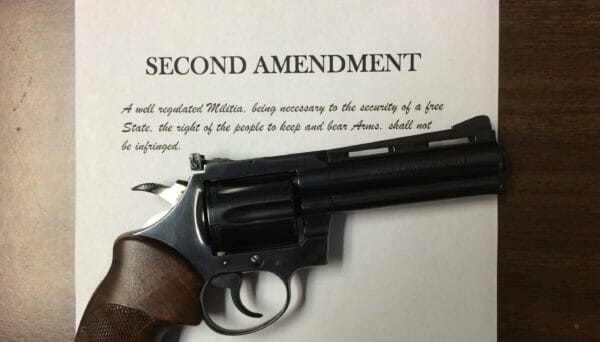
The Alaskan Legislature passed HB 61 on May 17, 2023. HB 61 ensures the right to keep and bear arms will not be abrogated by executive or local government fiat during a declared emergency. The Alaskan House voted to pass the bill 26 to 12 on May 5th. The Senate passed the bill 17 to 3 on May 16. The House concurred with the Senate version on May 17. HB 61 is awaiting signature by Governor (R) Mike Dunleavy. This correspondent has not found any statement by Governor Dunleavy for or against HB61. While the lopsided votes in the House and Senate would make signing the bill appear automatic, the bill limits executive power more than legislative power. Here is a part of HB61, as sent to Governor Dunleavy showing Legislative Intent:
LEGISLATIVE INTENT. It is the intent of the legislature that this Act does not affect the ability of the state or a municipality to exercise its duties under AS 29.35.145.
* Sec. 2. AS 44.99 is amended by adding new sections to article 5 to read:
Sec. 44.99.510. Infringements on the right to keep and bear arms; disaster.
(a) During a disaster emergency declared under AS 26.23.020, the governor, a stateagency, or a municipality may not issue or adopt an order, proclamation, regulation,
ordinance, or policy
(1) forbidding the possession, use, or transfer of a firearm, a firearm part, a firearm accessory, ammunition, or other weapon for personal use;
(2) ordering the seizure or confiscation of a firearm, a firearm part, a firearm accessory, ammunition, or other weapon for personal use;
One of the reasons such laws have been promoted was the egregious disarmament of innocent people in Louisiana after Hurricane Katrina.
The use of “emergencies” to do what cannot be done in ordinary circumstances has a very long pedigree in politics. Rahm Emanuel said, “You never want a serious crisis to go to waste.”
During the Cold War, this correspondent recalls reading U.S. Civil Defense documents. One of the policies was that any people entering public fallout shelters would be disarmed. Many states have “emergency powers” laws that allow the executive to ignore the Bill of Rights during emergencies. Governors have used their emergency power to shut down gun stores and ammunition sales during “emergencies”. Governor Northam of Virginia declared an emergency and banned the carry of weapons during Lobby Day in 2020. Overseas, there are several examples of people being forbidden to be armed in declared emergencies, such as the Philippines or Venezuela, or as this correspondent experienced in Panama under the Noriega regime in the 1980s. Such declared emergencies often stretch into years and become permanent policy, with or without legislation. In these declared emergencies, state agents are not disarmed.
“Emergencies” are exactly the time when citizens should be armed. It is when the population is most vulnerable, when criminals are emboldened, and when the government’s ability to maintain order is least effective.
The concept behind the structure of the United States is the people are the source of governmental power. This is a basic, but not sole, reason for the Second Amendment. Times of emergency are exactly when the armed population of the United States, severally or only one state or location, need to exercise their power and right to maintain public order. There is a long tradition in the United States of communities spontaneously forming local militias to maintain order.
Several states have repealed or reformed laws that give the government power to prevent people from being legally armed or able to purchase firearms or ammunition during an emergency. Texas passed HB1500 in 2021, forbidding state or local governments from prohibiting the sale or carry of firearms during a declared emergency. Some California measures closing gun shops and ranges during Covid were found to be unconstitutional.
To those who preach faith in the power of unlimited government, preventing the government from infringing on fundamental rights is a bad idea. They claim the government is never going to do anything bad to us, so don’t restrict governmental power. While they worship government power, they claim Second Amendment supporters worship guns.
Two of the many purposes of such bills are to show the drastic nature and fundamental flaws of laws that allow governments to disarm innocent Americans. Those who wish the people disarmed claim nothing bad will happen, they claim disarming the people is for the people’s own good. They claim disarmament will never happen while ignoring actual bans and confiscations that have happened.
This correspondent has no doubt those who wish to destroy the Republic, the rule of law, and the Constitution will continue to work hard to accomplish those things. They have gained control of the administrative state, the executive branch, and half the Congress. Enacting laws at the state level, to preserve the power and spirit of resistance, is good policy.
One of the primary purposes of an armed population is the confidence in the power of the people an armed society creates.
About Dean Weingarten:
Dean Weingarten has been a peace officer, a military officer, was on the University of Wisconsin Pistol Team for four years, and was first certified to teach firearms safety in 1973. He taught the Arizona concealed carry course for fifteen years until the goal of Constitutional Carry was attained. He has degrees in meteorology and mining engineering, and retired from the Department of Defense after a 30 year career in Army Research, Development, Testing, and Evaluation.

from https://ift.tt/HqDeKzk
via IFTTT

No comments:
Post a Comment